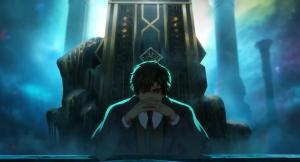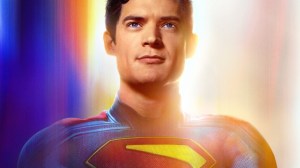C2E2 is this weekend in Chicago and the event will offer fans the chance to meet a Star Trek legend. Walter Koenig played Ensign Pavel Chekov in Star Trek: The Original Series, the first seven Star Trek movies, and he even reprised the role in a number of unofficial Star Trek fan projects. He also played Psi Cop Alfred Bester in the sci-fi television series Babylon 5. He’ll be at the event all weekend to sign autographs, take photos, and participate in a spotlight panel. Ahead of his trip out to C2E2, ComicBook.com spoke to Koenig about the convention community, Star Trek fandom, Babylon 5, and Chekov’s legacy.
Videos by ComicBook.com
*********************
You’re headed to C2E2. When you go to shows like this, what do you most look forward to?
Walter Koenig: Getting off the airplane. I don’t like flying anymore. It’s nothing to do with fear it’s to do with boredom and fatigue. It just wears me out.
Once I’m at a convention, I generally have a good time. I like the fans. The fans are very supportive after all these years, those who know who I am at this point. That’s always nice. I ran into folks, actors who I’ve never met and I’ve had curiosity about over the years. I get a chance to say hello to them. Sometimes we even go to dinner. So between the fans and the actors, who I don’t know and those that I do, it’s a nice compliment. A new experience and reunion. So I enjoy that. I like interacting with the fans. I feel that’s my job. It’s not a matter of just signing autographs and going on to the next person. It’s engaging in a little conversation, checking out where they’re from. That’s pretty much the things that I look forward to.

As a member of the original Star Trek cast, you’ve been a part of the convention community since its inception. How has it changed over the years?
WK: Well the biggest change, and it will be self evident with the big conventions like the one in Chicago, is that it has become a very wide spectrum of interest that draws the fans. It isn’t simply Star Trek or Star Wars. And they are into game playing, they’re into It seems like so many different things. I mean 15 year old game playing champions are signing autographs. That’s beyond my experience and beyond my knowledge. I don’t know anything about them. There’s so many artists at conventions now. There are folks of all different stripes who are hawking their wares. I’m not even familiar with what they’re selling. It’s a different world.
It has expanded so much since when I first started doing conventions and Star Trek was pretty much then the only reason folks were coming. Now it’s a couple of generations past when Star Trek was even a viable commodity other than the movies. And now of course the new TV series, but and it’s a different world, different folks. They’re still dressing up in costume, but these are costumes I don’t recognize. Fandom has certainly changed in the course of all these years.
With all the changes in Star Trek over the years, and now that we’re onto really a third generation of shows and fans, have you noticed a change in how the fans relate to the franchise over the years?
WL: Well, actually, my sense is that the long time fans who were introduced to Star Trek by their parents and who actually bonded with their parents over Star Trek — so we’re talking Star Trek was on the air 60 years ago, we’re talking people who are in their thirties, forties now — they’re still very congenial, very warm, very giving. In fact, the thing that I like hearing most is that they were introduced to Star Trek by their family and it was a bonding element for them. That they hung out together on the sofa watching it. That’s the message of Star Trek, bringing people together and being able to communicate and have a commonality. And so I hear that frequently. It’s not as if it’s just once in a while. So I feel that in that regard I can still garner or squeeze out some sense of relevance to today’s public. Otherwise, I don’t work very much and I am in nothing that is that current that they can relate to. So it’s that sense of bonding that I feel is strongest, the bonding, the family bonding, that I feel is the strongest element, the strongest connection that I have with them, today’s fandom.
Besides Star Trek, you were also Babylon 5. How does your experience with that show compare to Star Trek, as an actor and as far as how you relate to its fans?
WK: Babylon 5 definitely affected me. First of all, people still come up and talk about it. I have a few photos on my table that are from Bab 5 and a lot of folks who said they really, really liked my character. Modesty prevents me from stressing in more detail how they feel. But I felt that on Star Trek I was more of a novelty. On Babylon 5 I felt more like a real dimensional character. And that makes me feel good that people appreciated my work. It sort of reinforces my own sense of self. Because I can find a million reasons to ignore my popularity or to hold my popularity on Star Trek at a very modest level.
But Babylon 5, I think it tested me to some greater degree as a performer, and to be appreciated for that work it feels good. It feels very good. I enjoy working with all of those people. I didn’t come away with any hard feelings. It was a very comfortable time. So [J. Michael] Straczynski, the producer, was an incredible guy, and I liked working with all the folks, Bruce [Boxleitner] and Jerry [Doyle] and everybody else on the show. If you want to judge my talent on something specific, I think I come off better as a character on Babylon 5 than I do on Star Trek. It’s not that I didn’t do my job well on Star Trek, it was just that it was so limited. There were so few opportunities that I think it’d be hard to make a general statement about my ability. I think with more prevalence the measure of my ability was more accessible on the Babylon 5 show.
Outside of official Star Trek, you’ve also appeared in a handful of Star Trek fan films like Star Trek: Renegades. What has that experience been like? How does it compare to your experiences working in Hollywood?
WK: That was good. I’ve been on a lifetime search it seems to develop Chekov into a living, breathing being and not simply a two-dimensional cardboard representation. He was in every sense of the word a supporting character, there more to help detail the plot as opposed to learning about him as a character; an expositional character there to help promote the story but not really to get insight into how he felt and what he believed in. And I did the first fan film because they came up with an idea that I felt I could sink my teeth into and perhaps expose a little bit more of who Chekov was.
There are times when I feel a certain reluctance about talking about it because I want to make understood that it wasn’t a matter of living in the past or trying to rekindle that sense of popularity that I had as an actor playing that character. I wasn’t looking to satisfy some ego need but rather to help develop this character more, to make him more of a living being. In “To Serve All My Days” [an episode of the fan series Star Trek: New Voyages], he goes through all those stages of anger, denial, compromise, acceptance when you know you’re going to die. And that’s of course what happens to Chekov in that sequel to [Star Trek: The Original Series episode] “The Deadly Years.” And so I thought that was a challenge and a chance to invest the character with a little more humanity and have him be less a device and more a person.
And as far as the others are concerned, I don’t know. My career has not been sterling over the last couple of decades. And I’m an actor and I want to work, and this gave me the opportunity to play a character 20 and 30 years later without hair and in effect, almost somebody else as opposed to the young character that I played when I first started on Star Trek. So it was mostly just having an opportunity to get in front of the camera and to do some work. But in any case, I regretted none of it. I had a good time.
And even in Of Gods And Men that also was a challenge and fun, because Chekov was only the traditional undefined character in the beginning and then he became this bitter, angry rebel who had lost his wife and child. And I thought, ‘Well, here’s something that I haven’t had a chance to do, to play that kind of character. To feel those kinds of feelings and then to be given an opportunity to express them.’ So there was a reason for all of them. It had all to do with getting an opportunity to act once again.
Given how much you’ve worked on Chekov now in those fan films, do you think you’d still be interested in reprising the role in something more official, should the opportunity arise?
WK: Well, I don’t think I want to do any more short independent films playing Chekov. I just think I’ve run that dry. I don’t think I’d want to be that character in Patrick Stewart’s new series. Mind you, nobody has asked me to either so it’s an academic question.
But no, matter of fact for the first time in over 20 years I’ve engaged a new agent. I really wasn’t going out. It wasn’t as if I had submitted to various projects and I’ve been turned down. I never got a chance to. In the last couple of decades, I haven’t had much of a chance to work in the establishment industry. I very, very recently, within the last six months have acquired a new agent. Very young, aggressive agents who have faith in my ability. They know my work and we’ll see. I’m 83 for God’s sake. How many parts are there for me? But notwithstanding, I look forward to the opportunity to audition and see where that takes me.
*************************
C2E2 takes place from February 28th through March 1st at McCormick Place in Chicago.









